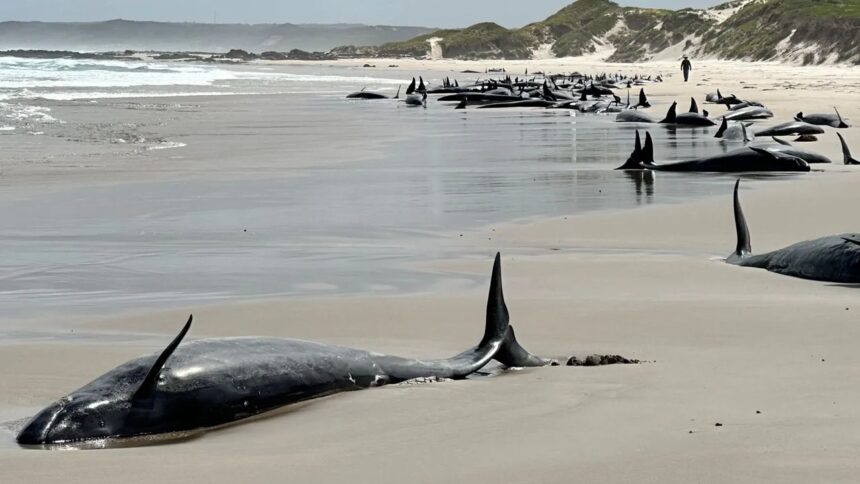Australian authorities are euthanising approximately 90 false killer whales after a devastating mass stranding on a remote beach in Tasmania.
The surviving whales, part of a 157-strong pod, have been under extreme stress for up to 48 hours, and experts have deemed a rescue attempt impossible due to complex conditions at the site. The remaining whales had already perished shortly after beaching near Arthur River in the island’s northwest.
False killer whales, one of the world’s largest dolphin species, have not mass stranded in Tasmania for over 50 years. These marine mammals, which can grow up to 6m (19ft) and weigh 1.5 tonnes, are known for their strong social bonds, making mass strandings a heartbreaking sight. Local resident Jocelyn Flint, who visited the site, described the distressing scene: “Their eyes are open, they’re looking at me, like ‘help.’ It’s just absolutely horrific.”
The remote location has added to the challenges of a rescue operation. Marine biologist Kris Carlyon noted that the steep, single-lane road leading to the site made it nearly impossible to transport equipment. Efforts to refloat two of the whales were unsuccessful, as rough surf prevented them from returning to open waters. “The animals just can’t get past the break to get out. They keep turning around and coming back towards the beach,” said Shelley Graham from Tasmania’s Parks and Wildlife Service.
With weather conditions expected to remain unfavorable, wildlife veterinarians made the difficult decision to euthanise the surviving whales. Authorities stress that this was a last resort after all other options failed. “The longer these animals are stranded, the longer they are suffering,” Dr. Carlyon explained. The euthanasia process, which involves shooting the whales, began on Wednesday and is expected to continue into Thursday.
Authorities are also grappling with how to manage the carcasses. Given that the site holds cultural significance for Aboriginal communities, officials have suggested that nature may be allowed to take its course. Meanwhile, the public has been urged to avoid the area, as ongoing bushfires and limited road access pose further safety concerns.
Tasmania has become a hotspot for whale strandings, with over 80% of Australia’s cases occurring there. The region witnessed the country’s worst recorded stranding in 2020, when 470 pilot whales were beached in Macquarie Harbour, leading to the deaths of 350 despite large-scale rescue efforts. A similar tragedy occurred in 2022 with another 200 whales stranded.

The cause of these mass strandings remains a mystery. Some experts believe whales follow their prey too close to shore, while others suggest that a single disoriented leader may unintentionally guide an entire pod into danger. Regardless of the reason, the Tasmania stranding is yet another stark reminder of the vulnerability of these highly intelligent and social marine creatures.








